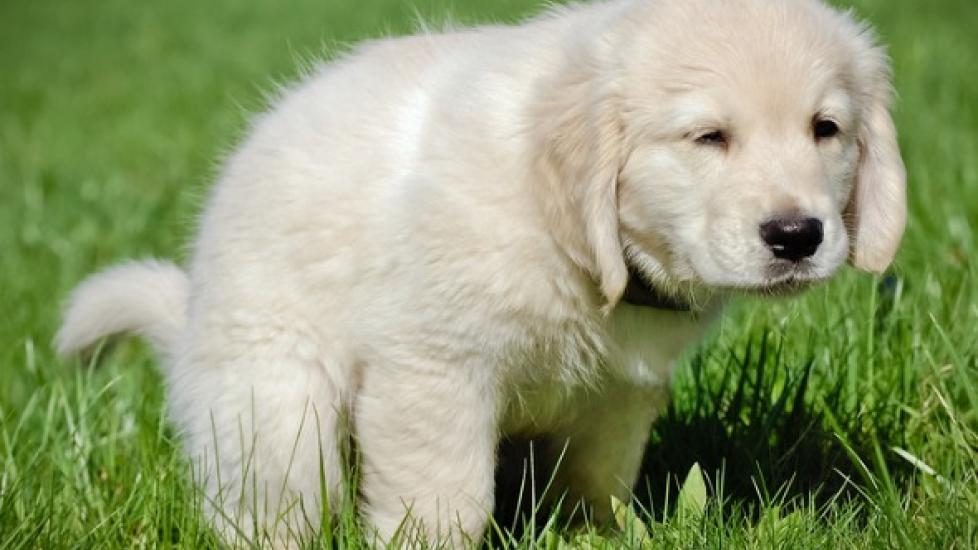How Often Do Puppies Poop?
You just took your puppy for a walk, and they did several large poops, but now your puppy is squatting to poop just inside the door. At times, it can seem like your new puppy is made of poop!
But is this normal? Do puppies really poop more than adult dogs, and why? Here are the answers to everything you wanted to know about how often puppies should be pooping.
How Often Should a Puppy Poop?
In general, puppies poop a lot. They are small, with an intestinal tract that is still developing. Food is processed very quickly, and sometimes it’s not as thoroughly digested as it could be. In general, the younger the dog, the faster that the food will move through their digestive tract.
It is not uncommon for a puppy to defecate 5-6 times per day. Some will eliminate even more frequently.
The good news is that the pace of pooping will slow down as the dog matures. Although a 2-week-old puppy may defecate at every feeding, by 12 weeks, they may be down to only 4 times per day. By 6 months, it may be 3 times per day. Usually by 1 year of age, they will have settled into their “normal” habits. An adult dog usually poops once a day, but they could go up to 3 times a day.
As your puppy’s pooping schedule settles down, you’ll begin to see what’s considered “normal” for them. Any changes in your puppy’s pooping routine should be gradual, so if you notice any sudden shifts, call your veterinarian.
Pay attention to the frequency as well as the consistency, color, texture, and any coatings. Also make note of anything that doesn’t belong in stool, such as fragments of worms (they may look like spaghetti or grains of rice) or any pieces of toys or other things your pup may have eaten.
What If Your Puppy Poops a Lot More Than the Average?
It can be hard to compare puppies, since there’s a wide range of what’s considered “average.” Some puppies will poop more frequently, and others less frequently. The most important thing to pay attention to is what’s normal for your puppy.
If you suddenly notice that your puppy is defecating more than usual, look for any changes in color, consistency, or coatings, and pay attention to how your puppy is acting. Look for signs of discomfort and monitor your puppy for 24 hours. If the changes in the stool persist, or they aren’t eating, active, and perky, it’s time to call the vet.
Almost all puppies are also born with intestinal parasites. This is one of the reasons veterinarians recommend deworming and testing stool samples frequently while they are young. Parasites can affect your puppy’s stool, so it’s best to have your vet diagnose and treat them.
What If Your Puppy Isn't Pooping Enough?
This is rare in a healthy puppy! If your puppy suddenly starts producing less poop or straining, they may have eaten something that is causing an intestinal blockage. A possible intestinal blockage is an emergency situation. Anything your puppy chews, such as pieces of a chew toy or squeaker, can cause an intestinal blockage.
Pups that aren’t feeling well or eating normally will also produce less stool than a normal, active puppy.
If your puppy isn’t defecating enough or there is a sudden change, call your veterinarian right away.
When Should a Puppy Poop?
Most puppies need to poop shortly after eating, but this can vary. It takes time for them to understand when their body is signaling they need to go, so training your puppy to go outside may take some time.
After you feed your puppy, wait a few minutes, and then take them outside. Staying outside with your puppy until they’ve pooped will reduce the chance they’ll come back inside and poop right away.
Look for signs that your puppy needs to go, such as looking around and starting to sniff the floor. They may begin to circle and posture as if they are about to go. As soon as you notice the signs that pup is getting ready to go, get them outside quickly to aid in house-training!
What Should Your Puppy's Poop Look Like?
Puppy poo can be extremely variable in appearance, which can make it challenging to determine what is normal. As a rule, however, puppy stool should resemble a soft, large Tootsie roll. It should be brown and well-formed (not soft or runny or too hard).
The size of the stool will vary with the size of the dog, the time of day, and their diet, but pay attention to especially large or small stools. A small amount of mucus covering the stool is normal, but this should not be blood-tinged. Finally, make sure there isn’t any foreign, undigested material in your puppy’s poop.
Before long, you’ll get a good sense what is normal for your puppy. If you notice something that doesn’t seem right, contact your veterinarian right away. Puppies’ elimination habits and stools change with time, but those changes should be gradual. Over time, your little pooping machine will go less and start to fall into a consistent pattern.
Featured image: iStock.com/Logorilla
